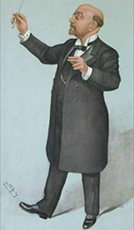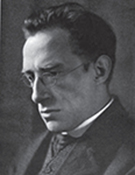Discoveries from the Fleisher Collection: Mackenzie, Holbrooke, and British Music Coming into Its Own
By Fleisher CollectionMackenzie, Holbrooke, and British Music Coming into Its Own
- Josef Holbrooke (1878–1958). Pantomime Suite (Ballet from Pierrot and Pierrette) (1908)
- Alexander Mackenzie (1847–1935). Scottish Concerto for Piano and Orchestra (1897)
- Holbrooke. The Girl I Left Behind Me, Symphonic Variations (1908)
 Two British composers populate this month's Discoveries from the Fleisher Collection. Josef Holbrooke and Alexander Mackenzie were both well known and enjoyed success, but they often struggled to gain more than a foothold in performance circles. Holbrooke was also a critic and writer, whose opinions about music, especially music from outside of England, both rankled and were seen as self-serving. Mackenzie was busy for almost four decades running the Royal Academy of Music, which left him little time to compose. Nevertheless, he helped begin the renaissance of 20th-century British music, of which Holbrooke was a beneficiary.
Two British composers populate this month's Discoveries from the Fleisher Collection. Josef Holbrooke and Alexander Mackenzie were both well known and enjoyed success, but they often struggled to gain more than a foothold in performance circles. Holbrooke was also a critic and writer, whose opinions about music, especially music from outside of England, both rankled and were seen as self-serving. Mackenzie was busy for almost four decades running the Royal Academy of Music, which left him little time to compose. Nevertheless, he helped begin the renaissance of 20th-century British music, of which Holbrooke was a beneficiary.
Mackenzie's musical family included a violinist father and grandfather. Young Alexander played in his father's orchestra from the age of 8, and two years later he was studying in Germany. At 14 he was an employed violinist in a German orchestra. He later lived in Italy, and along with becoming fluent in German and Italian, he would become good friends with Liszt, von Bülow, Sarasate, Joseph Joachim, Clara Schumann, Gounod, and Dvořák.
He led the Royal Academy of Music from 1888 to 1924, bringing it to international stature. Conducting widely, he gave British premieres of European works, helped English composers, and among many official honors received the adulation of a 24-year-old Elgar, who said that meeting Mackenzie was "the event" of his life.
But for all his national and international success, Sir Alexander Mackenzie was moved by the music of his beloved Scotland. His "Scottish Concerto" is a lively dissertation on folk tunes and a pleasant introduction to this affable composer.
 "Affable" is the last adjective many people would be inclined to apply to Josef Holbrooke. Like William Henry Fry in America, Holbrooke complained often and loudly about the adulation of foreign composers at the expense, he thought, of homegrown ones. He pulled two of his works from a concert (something his career could ill afford), because the typeface of the foreign soloist's name was larger than his on the posters.
"Affable" is the last adjective many people would be inclined to apply to Josef Holbrooke. Like William Henry Fry in America, Holbrooke complained often and loudly about the adulation of foreign composers at the expense, he thought, of homegrown ones. He pulled two of his works from a concert (something his career could ill afford), because the typeface of the foreign soloist's name was larger than his on the posters.
And yet Hans Richter, Thomas Beecham, and Henry Wood conducted his music; Granville Bantock and others were his friends. He could be humorous and ebullient, but rarely did an opinion form in his brain but that he did not give it out.
His music is filled with sweep, color, and intricacy. Ironically, for all his bemoaning of foreign influence, his work is largely Wagnerian and Straussian. But there is an English warmth and—might we say—an affability to it that is endearing. Mackenzie at the beginning of a new English music, and Holbrooke in the next generation, are two composers who should fascinate us today.
Listen to Discoveries from the Fleisher Collection the first Saturday of each month from 5:00 p.m. to 6:00 p.m. on WRTI 90.1 FM Philadelphia, 97.7 Reading, 97.1 Allentown, WJAZ 91.7 Harrisburg, 90.7 York, WRTL 90.7 Lancaster Ephrata Lebanon, WRTY 91.1 Mount Pocono, 94.9 Wilkes-Barre, 99.1 Pottsville, 106.1 Scranton, WRTQ 91.3 Ocean City, WRTX 91.7 Dover, and on the web at www.wrti.org. Hosted by Kile Smith, former Curator of the Fleisher Collection, and Jack Moore, Program Director of WRTI. Encore presentations of the entire Discoveries series can be heard every Wednesday at 7:00 p.m. on WRTI-HD2 and you can explore the archives of the radio program essays dating back to 2002.
Have a question for Free Library staff? Please submit it to our Ask a Librarian page and receive a response within two business days.

